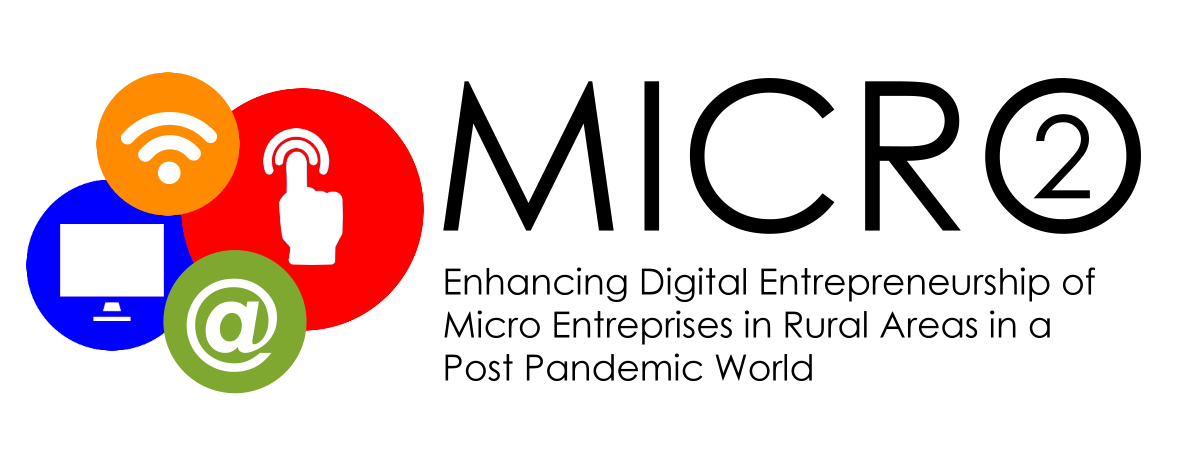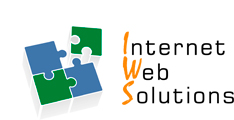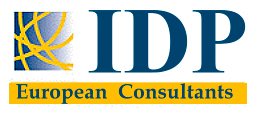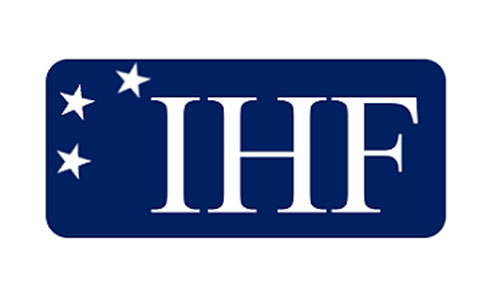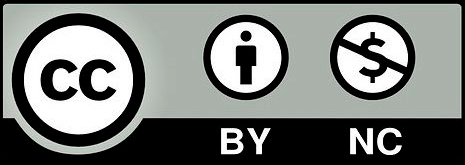News & Events
Remain up-to-date on all news and major events regarding the MICRO2 project.
The purpose of the MICRO2 project’s Sharing & Promotion Plan is to approach staff of microenterprises in rural areas, VET operators, enterprise support system in order to involve the to the project’s training and dissemination activities.
There will be press releases prepared every month in order to accomplish the various task, outcomes and intellectual outputs of the project, as well as to stimulate collaborative and cooperative work within the project’s activities.
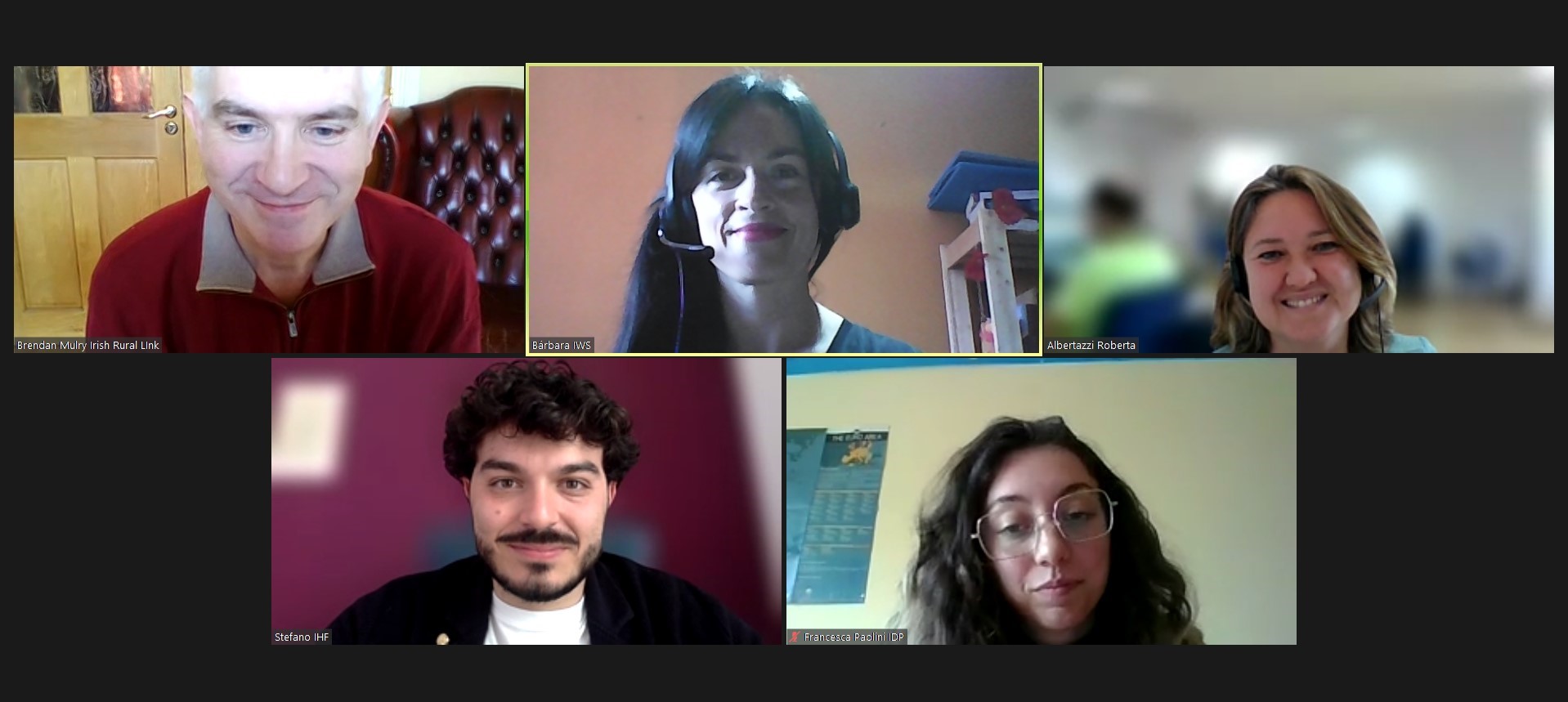 MICRO 2 Digital Approaches Conclusion: Partners gather for Online Closing Meeting
MICRO 2 Digital Approaches Conclusion: Partners gather for Online Closing Meeting
As the MICRO 2 Digital project draws to a close, partners met for a pivotal Closing Meeting to reflect on the journey, reviewing project’s achievements and discussing the final steps. This gathering marked a significant milestone in the project’s timeline, offering an opportunity to assess progress, share insights and lay the groundwork for latest tasks. Since its inception, the MICRO 2 project has been dedicated to enhancing digital skills among microenterprises in rural areas, with the aim of fostering growth, employment and social empowerment. With co-funding from the Erasmus+ Programme of the EU Commission, the project has brought together partners from across Ireland, Belgium, Italy, and Spain, uniting diverse expertise and perspectives to address common challenges. At the Closing Meeting, participants had the chance to review the project’s impact and discuss key achievements. From the development of innovative toolkits to the implementation of targeted training initiatives, MICRO 2 has made significant strides in advancing digital literacy and driving innovation within microenterprises. As the project enters its final stages, the spirit of collaboration and innovation that has defined MICRO 2 will continue to inspire partners and stakeholders. Looking ahead, the lessons learned and partnerships forged during this journey will serve as a solid foundation for future initiatives aimed at empowering microenterprises in the digital age. For more information on the MICRO 2 Digital project, visit: www.digitalmicro2.eu
Read More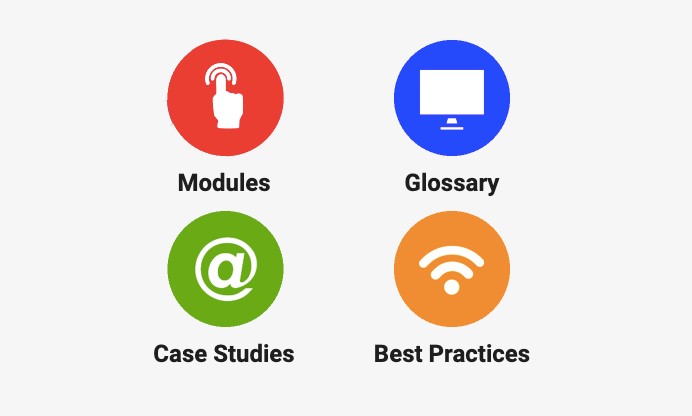 Enhancing Digitalisation of Microenterprises: MICRO 2 Project Launches Innovative Toolkit in Work Package 3
Enhancing Digitalisation of Microenterprises: MICRO 2 Project Launches Innovative Toolkit in Work Package 3
The MICRO 2 Digital project is proud to announce the online publication of training curricula as part of Work Package 3 of its innovative project. These resources - comprising modules, glossary, case studies and best practices - are set to enhance digital competences development and empower organisations to thrive in the digital era. Co-funded by the Erasmus+ Programme of the EU Commission, MICRO 2 Digital porject aims to advance digital skills among microenterprises in rural areas to drive growth, employment, and social empowerment. The partnership includes four organisations from Ireland, Belgium, Italy, and Spain. MICRO 2 Toolkit serves as a knowledge repository where training contents and tools are freely accessible and available for a practical application and highly effective upskilling in 3 languages - English, Spanish and Italian. The training contents were defined based on the results of Work Package n.2 “MICRO 2 Digital Model”, benchmarking the content with the DigComp and EntreComp competences for microenterprises in rural areas. Contents are divided into 4 specific sections: • Training modules • Glossary • Case studies • Best practices Concerning the training paths, these are the macro-topics and related modules that you can find on the OER platform: Cybersecurity & data management Course | Cybersecurity Essentials for Rural Micro-Enterprises: Securing digital and business transformation in the post-COVID era • Module 1. Cybersecurity fundamentals for a smooth digital transformation of rural MSMEs • Module 2. Cybersecurity Best practices to protect personal data and privacy Course | Effective Data Management Strategies for Rural Micro enterprises: Enabling Digital and Business Transformation in the Post-COVID Era • Module 1. Data management principles in Rural micro enterprises • Module 2. How to manage data effectively to enable digital and business transformation of rural MSMEs Digital marketing and digital communication Course | Digital Dynamo: Unleashing the Power of Digital Marketing • Module 1. Mastering Digital Marketing Strategies • Module 2. Digital Communication and Interaction E-commerce Course | Introduction to E-Business for Micro enterprises: E-Commerce and Online Sales • Module 1. Introduction to E-Commerce • Module 2. Setting Up Your Online Store • Module 3. Scaling Up Your Online Store Management in virtual settings Course | Leading and Managing Rural Micro Enterprises Through Digital Change • Module 1. Leadership for Rural Micro Enterprises • Module 2. Leadership Styles for Rural Micro-enterprises • Module 3. Managing Digital Change in Rural microenterprises Course | Hybrid Work Teams for Rural Micro Enterprises • Module 1. Promoting Effective Teamwork in a Hybrid Work Model for Rural Micro Enterprises • Module 2. ICT Tools for Hybrid Management • Module 3. Hybrid Working - Employer Obligations • Module 4. Keeping Hybrid Teams Motivated For an in-depth overview and to access the training pathways (modules, glossary, case studies, and best practices), please visit: https://digitalmicro2.eu/toolkit.php?lang=EN For more information on the MICRO 2 Digital project, visit: www.digitalmicro2.eu
Read More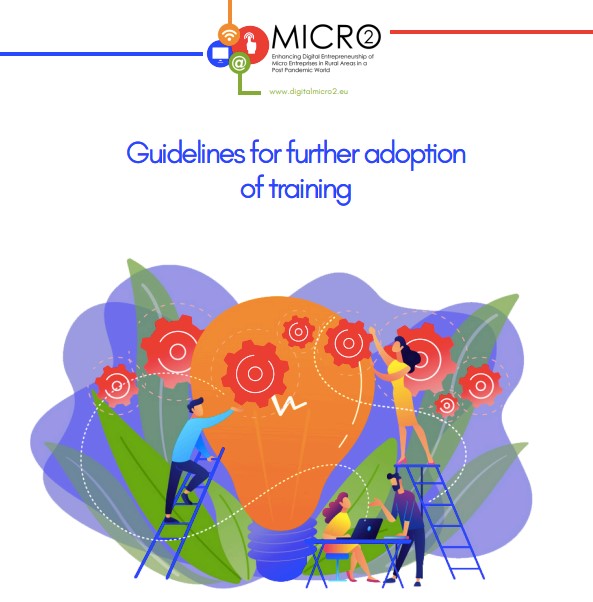 MICRO 2 Digital Project Follows Up on Testing and Validating Training with Practical Guidelines for Wider Adoption
MICRO 2 Digital Project Follows Up on Testing and Validating Training with Practical Guidelines for Wider Adoption
The MICRO 2 Digital project proudly announces the successful implementation of its Test and Validation phase (WP4), focused on testing and promoting training materials designed to enhance digital competences and entrepreneurship for microenterprises in rural areas. Co-funded by the Erasmus+ Programme of the EU Commission, the project aims to advance digital skills among microenterprises in rural areas to drive growth, employment, and social empowerment. The partnership comprises four organizations from Ireland, Belgium, Italy, and Spain. Through comprehensive testing and validation sessions, the project has confirmed the suitability of its training material across three languages and four countries, demonstrating its effectiveness for training. Training sessions, conducted both face-to-face and online, utilised official presentations and various online materials to illustrate concepts, showcasing the material’s adaptability for diverse learning environments. Despite varying testing contexts, all partners successfully participated, indicating strong community demand for this type of learning. Positive feedback highlighted the relevance, applicability, and completeness of the material and resources. Based on pilot sessions and project experience, practical guidelines have been developed to facilitate further adoption and replication of the initiative. These multilingual guidelines - English, Italian, Spanish - offer insights for trainers and training organisations to tailor the material to local contexts, ensuring an engaging and meaningful learning experience. For comprehensive access to the official guidelines document in English, visit: www.digitalmicro2.eu/mapping-docs/MICRO2_Guidelines_for_further_adoption_of_training_EN.pdf For more information on the MICRO 2 Digital project, visit: www.digitalmicro2.eu
Read More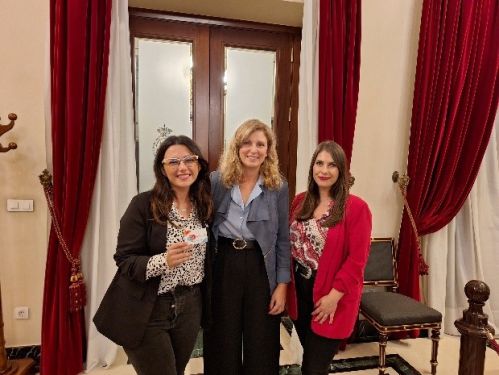 "Internet Web Solutions meets Senator Amparo Marco in the Spanish Senate in Madrid to present the Erasmus+ Project 'MICRO2': a synergy for a more inclusive and sustainable economic future for Spain and Europe"
"Internet Web Solutions meets Senator Amparo Marco in the Spanish Senate in Madrid to present the Erasmus+ Project 'MICRO2': a synergy for a more inclusive and sustainable economic future for Spain and Europe"
"Dreams and ambition drive us to unimaginable heights: we never stop dreaming and flying high" were the words the Senator gave to the two representatives of the IT partner Internet Web Solutions of the European Project MICRO2 (https://digitalmicro2.eu/ ) co-funded by the European Union under the Erasmus+ Programme Key Action 2, at the Spanish Senate in Madrid on 23 October 2023. The meeting was an opportunity to present the objectives of MICRO2: to help micro-enterprises in rural Spain and Europe embrace digital transformation by strengthening their digital competences and skills in e-commerce, cybersecurity and data management, marketing and digital communication. Senator Amparo Marco showed a deep interest in the project in which the Irish partner Irl Irish Rural link, the Belgian Institut de Haute Formation aux Politiques Communautaires asbl, the Italian IDP European Consultants, together with Internet Web Solutions (based in Málaga) are involved, recognising its potential for a positive socio-economic impact, as cybersecurity and the digital skills of small and medium-sized enterprises and individuals in financial matters are of utmost importance today, particularly in the post-pandemic era. During the conversation, new ways to highlight the MICRO2 project were explored. In particular, the Senator suggested the possibility of involving the Spanish Chambers of Commerce and the associations of small and medium-sized enterprises (PYMEs), in order to establish strategic partnerships for the dissemination of the project. This initiative aims to create synergies with stakeholders and actors in the Spanish economic ecosystem to promote entrepreneurial fomation, digital innovation and economic development. The meeting ended with a visit to the halls of the Spanish Senate and its historical library. Thank you for the interesting conversation, Senator!
Read More MICRO 2 Digital Project Unveils an Innovative Digital Competence Analysis Model for Rural Microenterprises in a Post-Pandemic Era
MICRO 2 Digital Project Unveils an Innovative Digital Competence Analysis Model for Rural Microenterprises in a Post-Pandemic Era
The MICRO 2 Digital project is proud to announce the successful development of the WP2 MICRO 2 Digital Model, a ground-breaking solution focused on analysing and assessing the most sought-after digital competences for microenterprises in rural areas in a post-pandemic era. The MICRO 2 Digital project, co-funded by the Erasmus+ Programme of the EU Commission, aims to advance digital competences and skills of microenterprises in rural areas as an engine for growth, employment and social empowerment. The partnership includes four organisations from four European countries (Ireland, Belgium, Italy and Spain). Through meticulous research and analysis, during the activities for WP2, the team has mapped the post-pandemic trends and digital skill gaps within rural microenterprises. This comprehensive understanding will allow partners to develop innovative training courses tailored to the identified training needs. Central to the development of the WP2 MICRO 2 Digital Model was the benchmarking process with established EU frameworks, specifically with DigComp 2.2 and EntreComp. By leveraging these existing frameworks, the project team ensured that the digital competences selected in the model align with European standards, fostering cohesion and compatibility across borders. One of the key deliverables of the WP2 and the project is the creation of the Digital Microenterprises Matrix. This matrix provides a systematic overview of the essential digital competences required for microenterprises in rural areas. By offering a structured approach, the Digital Microenterprises Matrix enables microenterprises to identify and prioritise the areas where they need to build their digital capabilities. There areas will be addressed by the MICRO 2 Digital Training Courses – during the development of the Work Package 3 (WP3) of the project. The basis of this Matrix was the development of three country-specific reports (for Ireland, Italy and Spain) and of a pan-EU snapshot, providing valuable insights into the digital landscape of microenterprises in different countries and regions. These four reports serve as essential resources for policymakers, industry stakeholders, and microenterprises themselves, fostering informed decision-making and strategic planning. In addition to these deliverables, the following were developed within the MICRO 2 Digital Model: • A Composite Report combining the four specific reports into a single document • An Executive Summary in multilanguage version (English, Italian and Spanish) summarising the main results of all reports and the entire Digital Model • A Common Knowledge Bank which constitutes the sources on which the research and analysis were based, representing the union of the literature reviews (bibliography + sitography) of each report • 16 including Case Studies and Good Practices in multilanguage version (English, Italian and Spanish) to provide practical examples of digital entrepreneurship of microenterprises in a post pandemic world For more information on WP2 deliverables, visit the direct link: www.digitalmicro2.eu/digitalmodel In addition, the deliverables themselves will soon be accessible in a smart and fast manner with the help of a chat assistant – the Chatbot – that the partnership is integrating into the project platform. For any further information on MICRO 2 Digital project: www.digitalmicro2.eu
Read More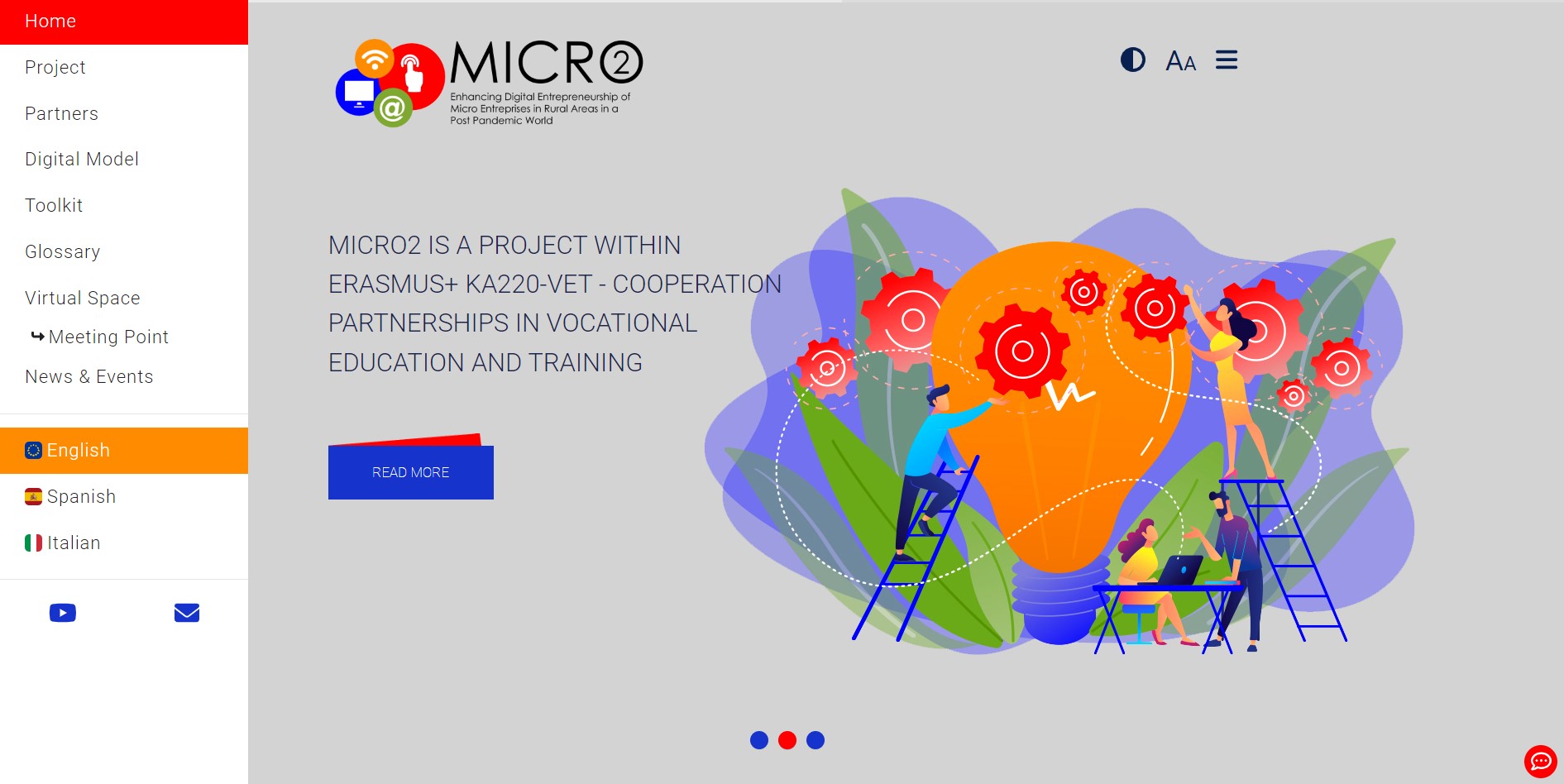 ENHANCING DIGITAL ENTREPRENEURSHIP OF MICRO ENTERPRISES IN RURAL AREAS IN A POST PANDEMIC WORLD
ENHANCING DIGITAL ENTREPRENEURSHIP OF MICRO ENTERPRISES IN RURAL AREAS IN A POST PANDEMIC WORLD
LAUNCH OF OPEN EDUCATION RESOURCE PLATFORM AND TRAINING TEST AND VALIDATION The MICRO 2 Digital Erasmus + Cooperation Partnership Project held its third transnational project meeting online in December to launch the online Open Education Resource Platform and Test and Validation Phase of the project Training Toolkit. Post Covid, digital innovation, innovative business models, changing nature of jobs and new methods of work are all radically reshaping the way companies operate. In Rural Europe, micro-enterprises of all types, with fewer than ten employees face the greatest challenges in making the very necessary digital transition. The MICRO 2 consortium is working on the Project to support rural microenterprises embrace digital transformation by tackling digital competences and skills development. The project also aims to enhance the responsiveness and coherence of the VET system in rural areas to meet increasing demand for digital competences by upgrading service provision in line with the revised Digital and Entrepreneurship Competency Frameworks of the European Commission (Digcomp 2.2, Entrecomp). Based on extensive transnational research, the consortium over the last year has developed a Training Toolkit specifically targeted at the Digital Entrepreneurship needs of the European rural micro enterprise. Modules include, Cybersecurity and Data Management, Digital Marketing and E-Business, Leading and Managing Digital Change and Hybrid Work Teams. An extensive range of real- world accompanying resources such as operational cases and good practices are included. The Training Toolkit has been developed to serve both independent and guided learning. The Toolbox is available online in 3 languages at https://digitalmicro2.eu/ . This Open Education Resources (OER) Platform is the main showcase of project’s results and its largest and most tangible channel for international visibility. All content is completely available for free, without requiring any kind of registration/identification by the user. Testing and Validation is a crucial phase of the project in order to fine tune the training offering. In the following months, partners will meet at least 60 learners from the target group across Europe to test the training material embedded in the MICRO 2 Digital OER Platform to collect feedback about usability, relevance to their needs and delivery means. Feedback from the wider public is also very welcome through the embedded survey on the platform. For further information about the MICRO2 Project please visit https://digitalmicro2.eu/
Read More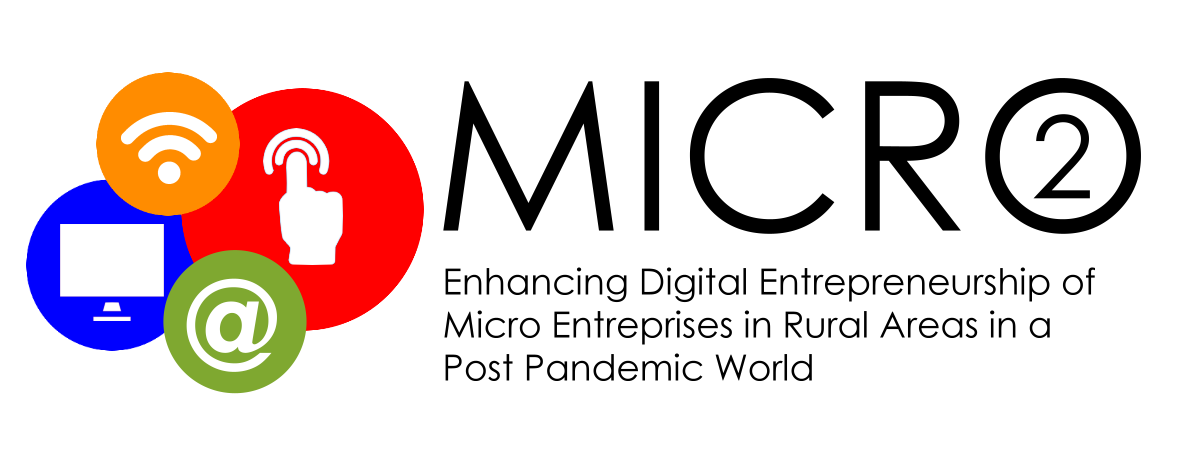 The MICRO2 consortium joined the Kick-off Meeting of this new European Funded Project in Brussels
The MICRO2 consortium joined the Kick-off Meeting of this new European Funded Project in Brussels
MICRO 2 aims to enhance the capacity of rural microenterprises to tackle digital and business transformation accelerated by the pandemic by developing training resources tailored to rural microenterprises facing capacity constraints to embrace digital opportunity. This will improve the business potential of rural micro enterprises to play a societal and economical role in their local area. Micro Enterprises already face inherent barriers for technology and digital adaptation due to their size and capacity. Those in rural areas face even more challenges due to geographical isolation from clusters and distance from opportunities such as networking, collaborations and training. The digital gap is 14% lower for rural micro enterprises at 48%. Micro enterprises are a key employer in rural areas and by supporting them to improve their digitalization will help them to grow and create more employment. In this context, Partners will carry out a series of well-defined activities that will lead to the production of tangible and operational results, and develop: Develop a resilient Digital Model for micro-enterprises in rural areas Map existing Government policies, agencies, and case studies in each partnering country and at EU level. Development of Multilanguage Training Programme - English, Italian and Spanish Build & Maintenance of the Micro 2 Digital Warehouse Platform - Open, Multilanguage and Flexible Digital Platform The meeting took place in Brussels, hosted by the Belgian Partner, IHF. The partners have all worked together on previous projects so were able to get straight in to analysing the details of the project plan and define roles and responsibilities to implement project objectives. The partners also discussed and agreed the visual identity of the project by choosing the logo and the website domain that will be online very soon. An action list was defined at the end of the meeting so that all that partners are on the same page in terms of activities, responsibilities and deadlines. MICRO 2 Digital is co-funded by the Erasmus Plus Programme of the European Commission with a duration of 18 months between November 2022 to April 2024. The project will be implemented by a partnership of four organisations from four European countries (Ireland, Belgium, Italy and Spain).
Read More